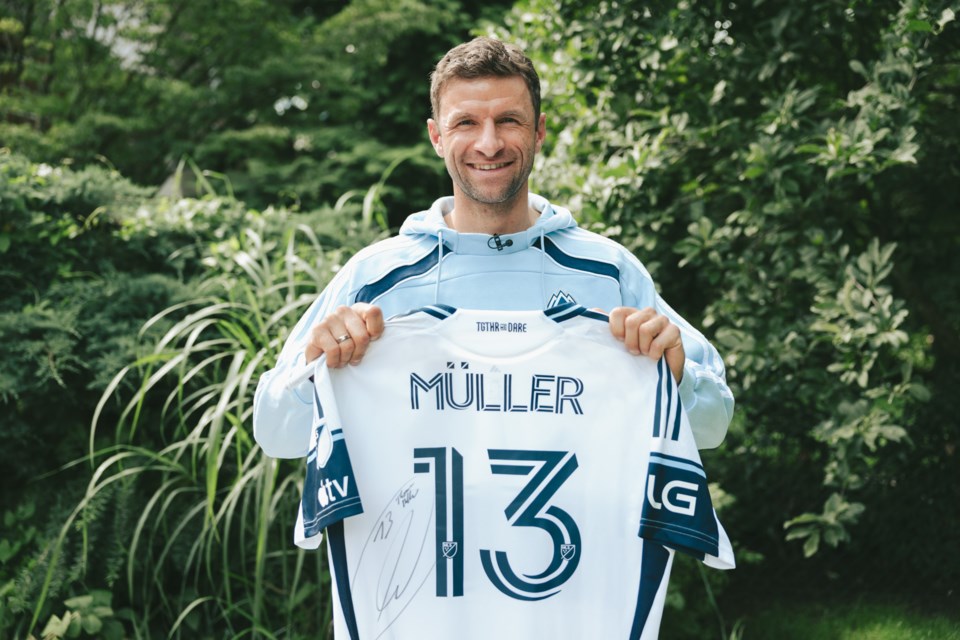Performance in sports humbles predictions. This year I have been wrong on the misfortunes of the Vancouver Canucks and BC Lions and good fortunes of the Toronto Blue Jays and Vancouver Whitecaps. I’m 0-for-4 on my favourite teams.
Business in sport, though, is clearer. Winning drives the business (Toronto Maple Leafs, excepted). The on-field ledger this season for the Whitecaps has been made clear now for months: on a thrifty roster, Vancouver has lived near the top of the West, punching above its payroll but missing one obvious piece to take it to new business heights.
That piece was shipped this week from Germany. Thomas Müller joining the Whitecaps is the franchise’s biggest bet ever—a business-sport inflection on the field, in the books, and in the city’s imagination.
Müller, the 17-year legend of Bayern Munich, even nearing the end of his career at age 35 is bound to be physically and intellectually superior to others on the pitch.
It is the boldest possible step for a franchise that over the years has treated its toonies like family heirlooms and placed its wallet in witness protection. It is an extraordinary statement by a team whose owners have it for sale, one that could have easily satisfied itself with a winning record and a so-so foray in the playoffs before finding a new proprietor.
But no, the Whitecaps—like the first-place Blue Jays, who are the opposite of cost-averse—are all-in suddenly on the championship culture. In their parity-tilted leagues, the windows appear open.
Müller likely plays a bit this weekend and as a fixture down the stretch, then is signed to return next year. Until him, the team’s best player this year was Ryan Gauld, but he has an injured knee capsule that likely keeps him out the rest of the season. Müller is much, much more than a stopgap.
By all accounts, he is one of the few stars fun to be around, a charismatic no-diva prankster. Teammates call him Radio Müller because he doesn’t turn off. He is sufficiently self-deprecating as to acknowledge he is not the fastest guy on the pitch, but a self-described “Raumdeuter”—a “space interpreter” who thrives on brains and timing. He has high standards, a low ego, a propensity to chat with fans, and a relentless drive to win. Sounds like the next prime minister.
If I may detour into lingo: Müller won’t outrun wingers; he’ll outthink back lines. As a free 8/10 (or second striker) he organizes the press, finds “third-man” lanes, and arrives late in the box. It’s the exact intelligence Vancouver needs while Gauld heals and once he returns. End of lingo detour.
The club manoeuvred within the salary rules to pay him a smaller amount this year (US$600,000) and a larger one next (US$7.5 million), while leaving room to bring in another major signing (a 9, for instance) in 2026. (Not to worry: Müller’s Bayern salary was 20.5 million euros, or about C$33 million, so there will be no GoFundMe drives to pay his Vancouver rent.)
For the Whitecaps, it ought to offer an opportunity to pack BC Place’s lower bowl of 22,000 and perhaps populate the upper one to fulfill the dream of a mostly-occupied venue of 54,000 capacity I remember a team executive confidently, errantly predicting a decade ago.
For the prospective buyer, Müller is an asset far more valuable than the salary he’ll earn. He is an immediate bridge to a steady return on investment and, if successful, a statement on how new ownership might be more comfortable to splurge on marquee names to lure fans more frequently. The Müller signing is about tens of thousands of butts in seats and many more brands on boards. It ought to spike season-ticket inquiries, a #13 jersey surge (when I looked, they’re long snapped up, only a quick batch of t-shirts are available), and new sponsor conversations, especially with European firms that recognize Müller’s global profile.
With Apple Inc.’s (Nasdaq:AAPL) minimum US$2.5 billion, 10-year broadcast investment in Major League Soccer, the league is increasingly a North American breeding pen and a global pasture for the sport. (Müller’s Bayern teammate, Canada’s Alphonso Davies, was 16 when he took the pitch as a Whitecap; he likely was helpful in selling the city and franchise as Müller mulled a move). But the league has brought David Beckham, Wayne Rooney, Zlatan Ibrahimović, Thierry Henry and of course Lionel Messi in at career twilights to build the game’s following in Canada and the United States. When they strut their talents on the pitch, the mismatch probably resembles what it would be like to watch an aging NHLer in an Argentinian hockey league.
The new ambition for the team is a purpose-built stadium, and talks with the city have started. But set that aside for the simple near-term play: pack BC Place and prove demand, push the team’s asking price higher in the process. If Müller lifts the tempo and the turnstiles, Vancouver won’t just have signed a legend; it will have reset the franchise’s ambition and the community’s sporting identity. That, finally, is a sports prediction safely worth making.
Kirk LaPointe is a Lodestar Media columnist with an extensive background in journalism. He is vice president in the office of the chair at Fulmer & Company.




